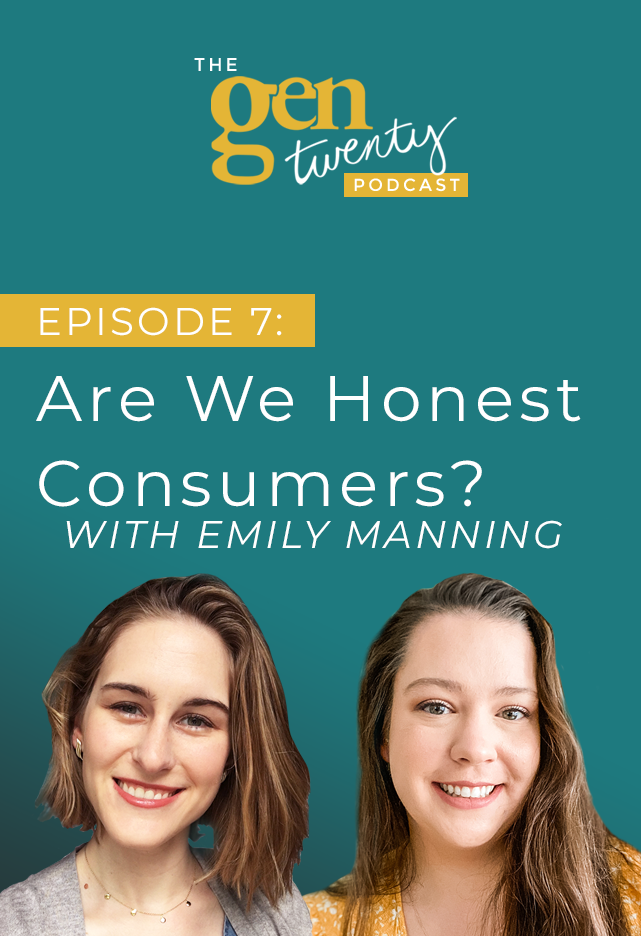
In this episode, Nicole and Marina interview Emily from The Honest Consumer and Give A Damn Goods. We talk about ethical fashion, conscious consumerism, and doing social good. We also cover how to get started, what it all means, and why it’s important.
Our guest, Emily, is the founder of blog The Honest Consumer and marketplace Give A Damn Goods, and she is passionate about ethical fashion, conscious consumerism, and social good.
She got her start in college where she was studying social entrepreneurship and learning about businesses doing social good and having positive impacts. Emily began working with the brand Branded Collective, a jewelry brand that works with survivors of human trafficking, and Emily learned more about supply chain and how there is trafficking and abuse of power in the fashion industry.
She was inspired to speak out, and began her blog, The Honest Consumer, to help highlight companies that were doing good. Emily noticed that many students on her college campus knew about and liked the big brand who had a positive social impact, like TOMS, but not many knew about smaller companies. So, The Honest Consumer was born, which led to her building her socially good marketplace, Give A Damn Goods
In the episode, we talk a lot about the terms “Fast Fashion,” “Ethical Fashion,” and what it really means for a business to be “Socially Conscious.” We thought we’d highlight the definitions below:
What is fast fashion?
Fast fashion is mass-produced clothing that is created to keep up with the trends, that aren’t necessarily created in a way that they’re meant to last. A lot of big fast fashion brands rely on consumers to view their clothing as disposable.
Many big brands outsource their supply chain for lower prices and quick turnaround times, which leads to the third party producers to have low wages and there is not a system in place to make sure they’re treated well.
What does it mean for a product to be ethical?
Thinking about the supply chain again, ethical products are considered “ethical” when the people who made them are treated fairly, with respect, given fair wages.
What does it mean for a business to be socially-conscious?
A broader term, thinking about the overall impact of a brand—from their environmental impact, to supply chain, and everything in between.
Why does any of this matter? Well, for starters, most people don’t know much about the companies they buy from or where their products come from, which means they don’t know if the people who are creating the products are treated fairly, have safe working conditions, or if they’re exploited. It also causes a disconnect where we become emotionless to these problems because they’re sort of out-of-sight-out-of-mind.
So, what can we do?
As always, big change can come from small choices. Start by supporting local and small businesses. Do your research before you buy from a brand to make sure their choices align with your values.
You can also shift your mindset on how you view clothing and other products. As a 90s kid, going to the mall and window shopping (or shopping-shopping) was a regular Saturday pastime, and I got such joy from shopping. But, I realized as an adult that it was 1) not sustainable for my wallet or tiny apartment storage and 2) the joy I felt was short-lived. I don’t want to have spending money as a coping mechanism, because that is a dangerous path. Now, I think about the lifespan of a product, and try to envision how it will help me. I ask myself, Do I really need this?
Invest in high-quality pieces that will last you years. Fast fashion is certainly more affordable, but if you look at the cost-per-wear in the long run the more expensive and higher quality pieces are better for you. If you buy a shirt for $100 and wear it for 5-10 years, you’ll get more wear for the price than a shirt you bought for $20 and kept for 8 months until it shrank beyond repair and got tossed.
And one final thing to think about:
How we treat people matters, and that goes for the brands we support. Each time you spend money, your dollars are “voting” for what you believe in.
Continue reading about ethical shopping on The Honest Consumer:
- ETHICAL CLOTHING BRAND ALTERNATIVES TO YOUR MALL FAVORITES
- 5 AFFORDABLE ORGANIC CLOTHING BRANDS
- 9 AFFORDABLE ETHICAL FASHION BRANDS MAKING IT EASY TO SAY GOODBYE TO FAST FASHION
- 8 ETHICAL CLOTHING BRANDS COLLEGE STUDENTS WILL LOVE & CAN ACTUALLY AFFORD
- 6+ ETHICAL CLOTHING BRANDS YOU CAN BUY AT NORDSTROM
- 6 EASY, AFFORDABLE FAIR TRADE PANTRY SWAPS
- 9 AFFORDABLE ETHICALLY MADE T-SHIRT BRANDS
- LIVING A ZERO WASTE LIFESTYLE
- Fair Trade Jewelry
- Made To Order Clothing
- How To Recycle Old Clothes
- Ethical Jewelry Brands
- What Is Vegan Leather
- What Are Sustainable Jeans?
